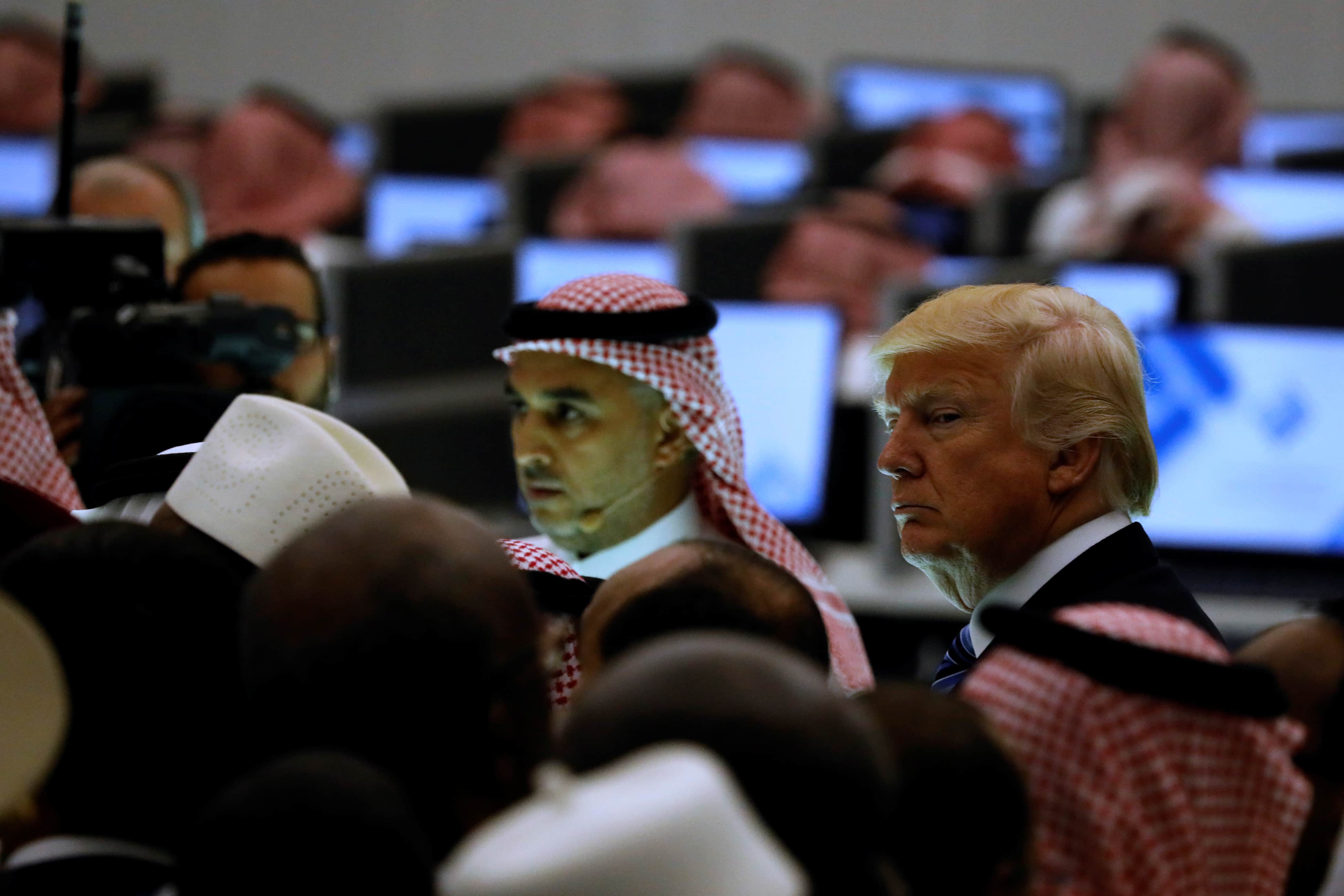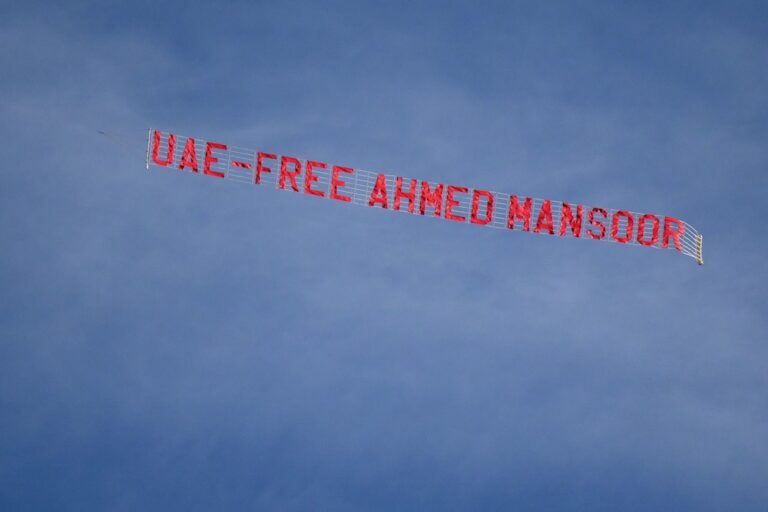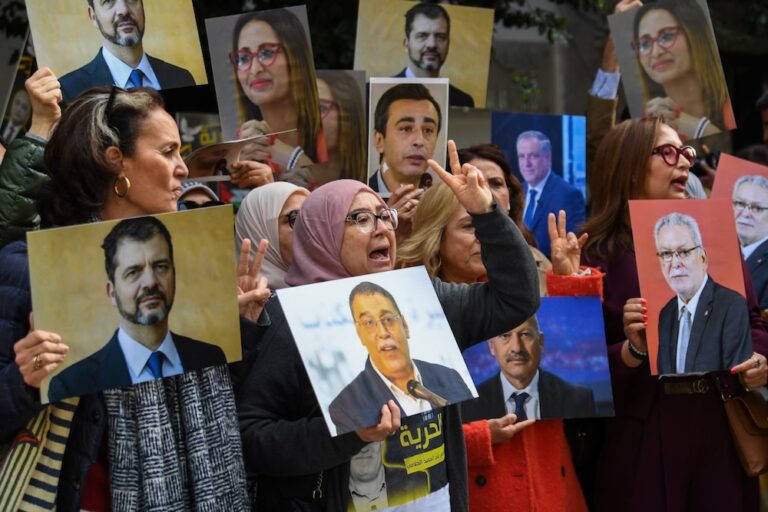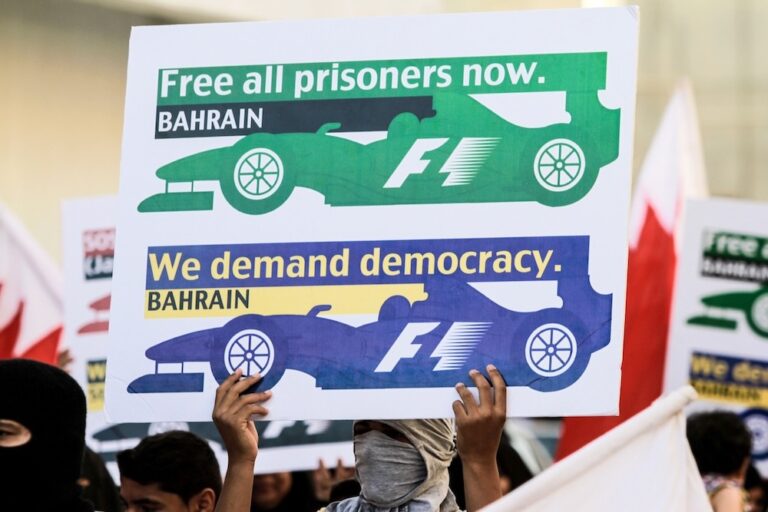As President Trump visited Saudi Arabia, repression hit new highs throughout the Middle East. But, though the level of repression to stamp out dissent may be new, the excuse was a very familiar one.
Ever since a power vacuum created in the aftermath of the 2011 Arab uprisings led to the rise of such terrorist groups as ISIS, Al-Nusra Front in Syria, and the Sinai-based Ansar Beit al-Maqdis, which has since pledged allegiance to ISIS, governments in the Middle East and North Africa have made it their modus operandi to use the threat of terrorism to national security as justification for infringing on their citizens’ rights and crushing any criticism of their rule.
The 2016 election of Donald Trump – a man who himself has a questionable relationship with freedom of expression and human rights – as president of the United States, further emboldened dictators, in the Middle East, and worldwide.
This month, as international media occupied itself with Trump’s arrival in Saudi Arabia to finalise US$110 billion in American arms sales to the kingdom and attend the opening of a new global counter-terrorism center based in Riyadh, the use of repressive measures ostensibly meant to combat terrorism has increased across the region, and those targeted count among their ranks writers, peaceful critics, political opponents and human rights defenders.
Egypt
Life under President Abdel Fattah El-Sisi, the Egyptian ruler Trump calls ‘fantastic’, has become unbearable for anyone that dares speak out against injustice, corruption or negligence by state officials and institutions. So much so, in fact, that the Arabic Network For Human Rights Information (ANHRI), an Egyptian rights group whose founder and employees have themselves been subjected to judicial harassment and threats of imprisonment, published on 22 May 2017 a legal guide for outspoken Egyptians on what to expect in the likely event they land in prison.
“There is no difference between you being a fan of the Ultras [football] teams, and getting arrested for cheering them on, or being a student, and getting kidnaped for engaging in student activism, or being an employee who wants to exercise his constitutional right to strike, and being detained for it, or simply being an individual interested in politics, and perhaps facing what is worse than arrest, being forcibly disappeared,” read the introductory statement to ANHRI’s guide.
In the face of a government clampdown on civil and human rights that shows no sign of slowing down, Egyptian human rights organisations have banded together to repeatedly condemn a police campaign against political activists that uses terrorism – a real and substantiated threat to Egypt’s stability – as an excuse to go after the dissenters. Meanwhile, militant attacks continue to terrorise the country. In fact, since Sisi’s takeover of power, and despite his stated commitment to fight terrorism, they have been on the increase.
The space for civil society continues to shrink. On 29 May, only days after a terrorist attack targeting Coptic Christians in Minya killed 28, Sisi chose to focus his energy on enacting a new law that imposes harsher regulations on aid groups than ever before – effectively forcing many of them to shut down.
In yet another case of using national security as the excuse for quelling dissent, the Egyptian government on 24 May ordered internet service providers to block access to 21 news websites, including the Huffington Post’s Arabic-language website, the independent news website Mada Masr, and some Qatari funded news outlets, chief among them Al Jazeera, for “supporting terrorism and spreading lies,” according to a high-level security source quoted by the state-run Al-Ahram news agency. The Committee to Protect Journalists (CPJ), Global Voices, ARTICLE 19, and ANHRI have published statements condemning what CPJ’s Sherif Mansour called “a new low in Egypt’s lamentable record on press freedom.”
Restricting the free flow of information: A regional trend
The move to ban several websites in Egypt coincided with a joint decision by authorities in Saudi Arabia, the United Arab Emirates, and Bahrain to block access to at least eight Qatari-funded news websites, including those of Al-Jazeera’s Arabic, English, and documentary channels.
The decision came in response to statements made against Saudi Arabia that were published by the Qatar state news agency after an alleged hack. “Gulf kingdoms should not hold the public’s right to information hostage to a diplomatic spat, and should immediately cease blocking Qatari-funded websites,” said Mansour in another CPJ statement.
On 3 May, Oman blocked access to the independent online magazine Mowatin, and on 15 May, extended the closure of Azamn newspaper by an additional three months. These incidents come as part of a series of repressive measures taken by Omani authorities in a broader crackdown on independent media.
The many ways journalists and critics are silenced in the Middle East and North Africa
While the recent spike in hastily blocking online news sites without judicial oversight is a worrying development, other harmful ways of silencing critics also prevail across the region.
On 16 May, authorities in Iraq’s Al-Anbar province ordered the bureau of Jordan-based Al-Dijlah TV channel in Ramadi closed after it aired a report alleging local government officials were involved in smuggling fuel and fighters to ISIS.
In Tunisia, journalist and founder of independent news website Nawaat Sami Ben Gharbia was interrogated for six hours on 3 May by Tunisian authorities over leaked documents, and in Morocco, the trial of seven prominent journalists and bloggers on serious charges that range from receiving illegal foreign funding to endangering state security resumed this month.
On 28 May, Qatari authorities forcibly deported Saudi human rights defender Mohammed Al-Otaibi back to Saudi Arabia as he was boarding a flight to Norway with his wife to seek asylum. Regional and international human rights organisations have consistently called on Qatar in previous months not to allow his extradition to Saudi Arabia, where he is on trial in the country’s notorious terrorism tribunal on charges solely related to his human rights work.
In the United Arab Emirates, three human rights defenders unjustly languish in jail on speech-related charges. Ahmad Mansoor, who received the prestigious Martin Ennals Award for Human Rights Defenders in 2015, has been in detention since 20 March 2017. Ossama Al-Najjar, who was scheduled for release on 17 March after serving his full three-year sentence, remains in prison today. And Nasser Bin Ghaith, who was sentenced to ten years in prison in a grossly unfair trial, is currently held incommunicado in a maximum security prison.
Bahrain’s more sinister approach to crushing dissent
For several years now, Bahraini authorities, with the backing of Saudi Arabia and its Western allies, have steadily become more and more belligerent in their approach to dissent and opposition.
Local journalists, critics, and rights advocates are routinely harassed by the judiciary, banned from travel, and detained for long periods without charge. Many of the kingdom’s well-known political opponents and prominent human rights defenders are behind bars. And as repressive as these measures to silence critics are, an even more sinister weapon against activists has been in frequent use across the nation: denationalisation.
The Bahraini government began revoking citizenship shortly after Arab uprisings engulfed large sections of the Middle East, Bahrain included, in 2011. According to Human Rights Watch, authorities stripped 208 nationals of their citizenship in 2015, and at least 133 in 2016. One of the individuals affected by this policy was Sheikh Isa Qassim, a leading Shia cleric and spiritual leader of Al Wefaq, Bahrain’s largest opposition society.
He was rendered stateless on 20 June 2016 and is on trial on spurious charges of money laundering. His hometown of Duraz has been at the center of daily protests against the decision ever since. His latest trial hearing, in which he received a one-year suspended sentence, coincided with Trump’s meeting with the Bahraini king on 21 May where he reaffirmed his commitment to the “wonderful relationship” between the two countries. Two days later, Bahrain’s security forces brutally attacked and dispersed what had turned into an 11-month protest near the house of Sheikh Qassim in Duraz. Five people were killed in the attack and hundreds arrested.
In a statement continuously being updated by the Bahrain Center for Human Rights (BCHR) on developments in Duraz, BCHR Senior Advisor Sheikh Maytham Al Salman said, “If the violations continue, denied by the Bahraini government and ignored by the international community, another cycle of violence and crackdown will undoubtedly take place in a region with hundreds of new victims, embittered by the repeated denial of their rights as human beings and Bahrainis.”
Hunger striking prisoners in Israel, Iran
Throughout the Middle East and North Africa, political prisoners, including prisoners of conscience, are languishing in jail on spurious convictions. States across the region have allowed, and in some cases even encouraged, unfair trial practices and long periods of administrative detention.
Such systematic miscarriages of justice often incite a sense of isolation and despair in prisoners. They elicit a deep distrust in the judicial system meant to protect them and so prisoners resort to the only form of protest that cannot be taken away from them: hunger strikes.
On 17 April, more than 1500 Palestinian prisoners went on hunger strike to protest conditions in Israeli jails and the practice of administrative detention. The prisoners included writers, journalists, and political activists and lasted for 40 days. Forty days without food and the one wish granted to prisoners from a long list of demands, including an end to solitary confinement, was a second family visit every month for all prisoners. The Palestinians have deemed it a successful strike.
At the same time, and as Iran’s presidential elections were underway, another high-profile hunger strike was unfolding inside Tehran’s notorious Evin prison. This one involved a woman journalist, Hengameh Shahidi, arrested on 9 March and kept in solitary confinement. Shahidi is currently serving a six-year prison sentence on charges of “gathering and colluding with intent to harm state security”. Towards the end of her two-month hunger strike protesting the dismal conditions she is kept in, Shahidi’s health began to deteriorate drastically. Family members and rights organisations expressed fears for her life but she only suspended her strike once the Iranian government allowed her family to visit on 16 May and promised to improve her appalling prison conditions. Iran is one of the world’s five biggest prisons for reporters, with a total of 30 journalists and citizen journalists currently detained. In a statement congratulating President Hassan Rouhani on a second term in office, ARTICLE 19 urged the new administration to prioritise the rights of Iranians to freely access information and exercise freedom of expression online without fear of repression.
War-torn Libya and Yemen: A disappearing freedom to inform
In countries ravaged by war, journalists, as citizens, are just trying to stay alive. As reporters, they are no longer targeted by established state institutions alone but by any and all parties to the conflict.
In Libya, where three rival governments are vying for control of the nation, journalists have been subjected to so much violence that, according to Reporters Without Borders, the freedom to inform could disappear altogether. Since 2011, RSF calculates that around 100 journalists have fled the country and many media outlets have relocated abroad.
In anticipation of a meeting between the European Union, United Nations, African Union and Arab League to discuss a political solution for the Libyan conflict, RSF published a statement calling for greater protection for Libyan journalists and media personnel at risk of kidnapping and possibly death.
In Yemen, ranked third most dangerous country for journalists in 2016 by CPJ, a bomb attack carried out by Houthi rebels on 26 May killed three photojournalists and injured two others. The International Federation of Journalists reported on the attack. The conflict in Yemen has caused such immense suffering and yet it is largely invisible to the world as local journalists have to contend with intimidation, kidnappings, and torture on top of the dangers that war, famine, and cholera already impose on all Yemenis.
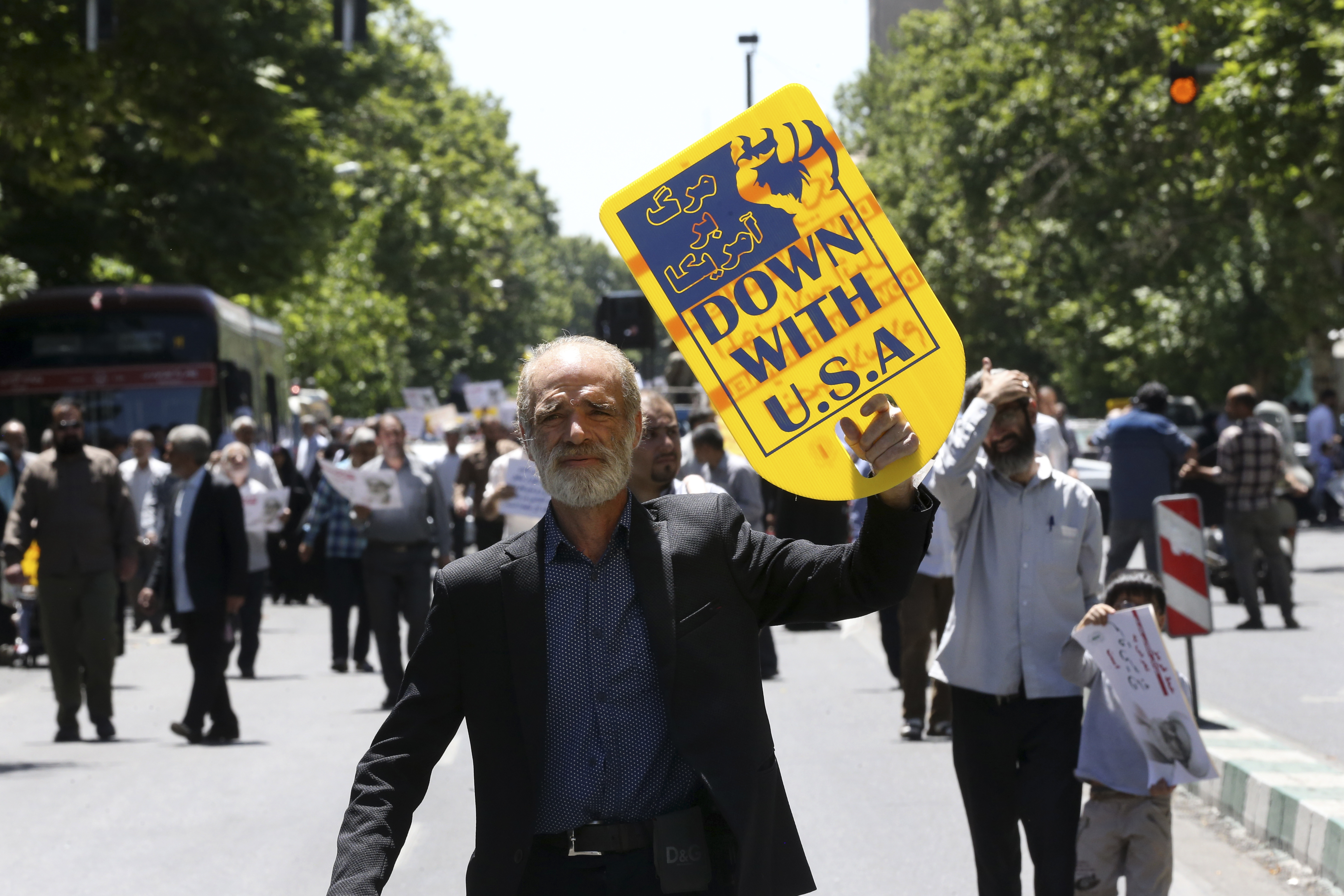
A man holds up an anti-U.S. placard during a protest against a Bahrain police raid on the hometown of Shiite cleric sheikh Isa Qassim, after Friday prayers in Tehran, Iran, 26 May 2017AP Photo/Vahid Salemi
